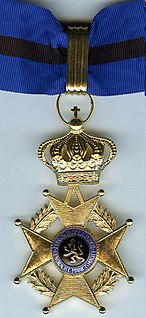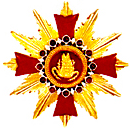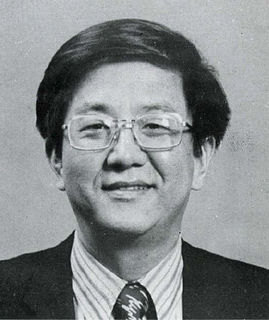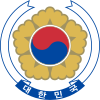The British honours system is a means of rewarding individuals' personal bravery, achievement, or service to the United Kingdom and the British Overseas Territories. The system consists of three types of award – honours, decorations and medals:

The Imperial Order of the Dragon of Annam was created on March 14, 1886, in the ancient Vietnamese city of Huế, by Emperor Đồng Khánh of the Imperial House of Annam, upon the "recommendation" of the President of France as a jointly awarded French colonial order. The Order was designed as a reward for services to the state, the French colonial government, or the emperor.
The orders, decorations, and medals of Canada comprise a complex system by which Canadians are honoured by the country's sovereign for actions or deeds that benefit their community or the country at large. Modelled on its British predecessor, the structure originated in the 1930s, but began to come to full fruition at the time of Canada's centennial in 1967, with the establishment of the Order of Canada, and has since grown in both size and scope to include dynastic and national orders, state, civil, and military decorations; and various campaign medals. The monarch in right of each Canadian province also issues distinct orders and medals to honour residents for work performed in just their province. The provincial honours, as with some of their national counterparts, grant the use of post-nominal letters and or supporters and other devices to be used on personal coats of arms.
The Orders, decorations, and medals of the Canadian provinces, in which each province of Canada has devised a system of orders and awards to honour residents for actions or deeds that benefit their local community or province, are in turn subsumed within the Canadian honours system. Each province sets their own rules and criteria on eligibility and also how each medal is awarded and presented. Most of the orders allow for the recipient to wear their orders in public, and most grant the recipients the use of post-nominal letters in their names.
The following is the Canadian order of precedence for decorations and medals. Where applicable, post-nominal letters are indicated.

The Order of Leopold II is an order of Belgium and is named in honor of King Leopold II. The decoration was established on 24 August 1900 by Leopold II as king of the Congo Free State and was in 1908, upon Congo being handed over to Belgium, incorporated into the Belgian awards system. The order is awarded for meritorious service to the sovereign of Belgium, and as a token of his personal goodwill. It can be awarded to both Belgians and foreigners, and is seen as diplomatic gift of merit.

The Order of Merit for National Foundation is one of South Korea's orders of merit. It is awarded by the President of South Korea for "outstanding meritorious services in the interest of founding or laying a foundation for the Republic of Korea." The order was established in 1962, under the military rule of the Supreme Council for National Reconstruction.
South African orders, decorations and medals are those military and civilian orders, decorations and medals issued by the Government of South Africa. The following is a (non-exhaustive) list of these:

The Grand Order of Mugunghwa is the highest order awarded by the government of South Korea. It is awarded to the President of South Korea, and it may be awarded to their spouse, heads or former heads of state of South Korean allies, and their spouses. The order is presented for, "Outstanding meritorious services in the interest of promoting the development and security of the Republic of Korea."
The Order of Military Merit is the primary military decoration awarded by the South Korean government. It is awarded to a person who rendered "outstanding military services by participating in an action in time of war or in quasi-state of war or by performing his/her duty equivalent to combat, such as responding to the attack of an enemy in a contact area."
Orders, decorations, and medals of Imperial Germany covers those decorations awarded by the states which came together under Prussian leadership to form the German Empire in 1871. For convenience's sake, this category also covers the decorations of the various German states which were no longer in existence in 1871, mainly because they had been annexed by Prussia during the Wars of Unification or before.

The orders, decorations and medals of Finland form a system through which the Finnish government shows its respect to persons who have distinguished themselves on some walk of life. The legal basis of the system is the Act on the displays of public recognition (1215/1999) which grants the president the authority to issue decrees on orders, medals and titles.
The Order of National Security Merit is one of South Korea's orders of merit. It is awarded by the President of South Korea for "outstanding meritorious services in the interest of national security."
The Order of Cultural Merit is one of South Korea's orders of merit. It is awarded by the President of South Korea for "outstanding meritorious services in the fields of culture and art in the interest of promoting the national culture and national development."
Orders, decorations, and medals of Turkey are civil and military state decorations regulated and bestowed by the Turkish Republic.

The Order of Diplomatic Service Merit is one of South Korea's orders of merit. It is awarded by the President of South Korea for "outstanding meritorious services in the interest of enhancing national prestige and promoting amity with allies." It is a relatively rare honor, being usually awarded to a handful of people every year, and is one of the highest civilian awards of South Korea.
The South Korean honors system includes orders of merit, medals of honor, and commendations conferred by the South Korean government onto its citizens and foreigners.
The Order of Service Merit is one of South Korea's orders of merit. It is awarded by the President of South Korea to public officials, private school teachers, and special post office employees for "outstanding meritorious services by applying himself/herself to his/her duties."
















